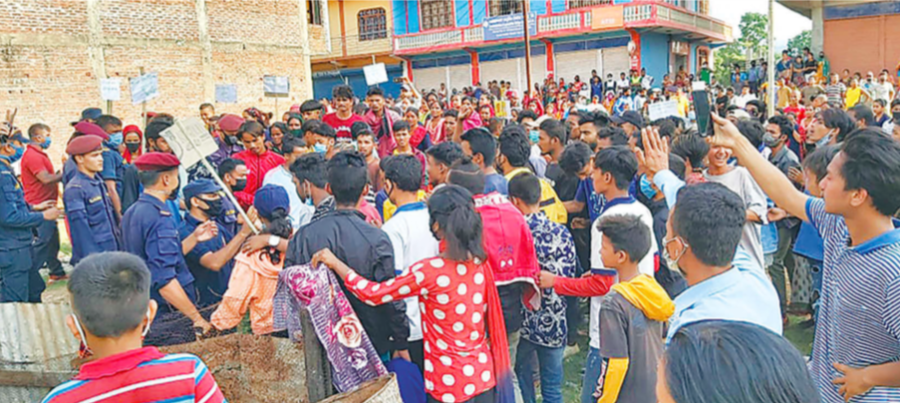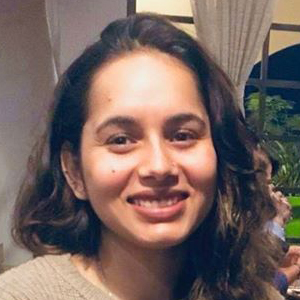National
Discrimination against Dalits continues to stain Nepal’s social fabric
Two recent incidents resulting in the killings of seven Dalit individuals have once again brought to light the uncomfortable fact that caste-based discrimination is alive and well.
Elisha Shrestha & Aditi Aryal
Asmita Rijal first experienced caste-based discrimination when she was 15-years-old and in tenth grade. Her teacher told her, very casually, that she was different from her peers because she was a kaami. This incident stuck with her, leading her to become wary of revealing her caste to anyone.
“I was too innocent to hide my caste from my teacher who used it to humiliate me,” said Rijal. “My family always taught me to never reveal my caste as a kaami or sunar when others asked. We always lied about our caste.”
Rijals can be either Brahmins or Dalits, and according to Rijal, she almost always identified herself as a Brahmin, only revealing her caste when she got close to someone.
This discomfort continued well into her adulthood and as a working professional, Rijal, now 21, reports feeling intimidated whenever her colleagues brought up the subject of caste. She has even been rejected by romantic partners for her caste, she says.
Rijal lives in Kathmandu and contrary to assumptions of caste-based discrimination as being limited to the rural hinterlands, her experiences testify to the fact that such prejudice remains alive and well even in educated, middle-class circles.
Rem Bahadur BK faces this bigotry each time he looks to rent a room in Kathmandu.
“Every house owner that I met would deny me a room as soon as I mentioned my caste,” said BK, president of the Jagaran Media Center, a Dalit media organisation based in Kathmandu. “Even now, it’s painful to recall those incidents not only because of the way I was discriminated against but because even today, people continue to believe in high and low castes.”
As the world combats the Covid-19 pandemic, measures taken to limit the spread of the coronavirus—social and physical distancing, isolation, lockdown—are reminiscent of the centuries-long discrimination that Dalits and other ethnic and religious minorities have had to go through. The nationwide lockdown, in force since March 24, has not stopped Covid-19 and it has not prevented acts of violence against Dalits from taking place.
According to BK from the Jagaran Media Center, there have been 31 documented cases of physical violence against Dalits during the lockdown period. Two recent cases, however, have galvanised the public—the killings of six men in Rukum (West), and Angira Pasi in Rupandehi. These killings have sparked a conversation around caste-based atrocities, with a number of protests by political parties and civil society. The United Nations and Human Rights Watch have both condemned the killings and called for a free and fair investigation. The hashtag #DalitLivesMatter is being widely promoted on social media as part of a campaign to give voice to stories of discrimination and ways to combat prejudice.
For decades, Nepal has struggled to abolish caste-based discrimination and untouchability. When the Civil Act 1963 was introduced, its biggest focus was to make caste-based discrimination a punishable offence. The Untouchability and Discrimination Act, promulgated in 2011, and the Constitution of Nepal both provide clear protections for Dalits, who make up 13.12 percent of the country’s population.
Despite these legal provisions, acts of violence against Dalits have continued across the country. Occasionally, these incidents have even escalated into murder, with at least 16 caste-based killings reported since the Untouchability and Discrimination Act came into force in 2011. Cases of discrimination rarely get to court and even if they result in convictions, the offenders are given small fines or minimal jail time of a few months.
Home Minister Ram Bahadur Thapa, on May 26, had told Parliament that a five-member probe team led by a joint-secretary from the ministry has been formed to look into the Rukum (West) killings. But even lawmakers doubt the ability of the investigation team to produce anything tangible. A number of Dalit parliamentarians, including Nepali Congress lawmaker Man Bahadur Bishwokarma and Nepal Communist Party (NCP) lawmaker Asha Kumari BK, have demanded the formation of an all-party parliamentary probe to look into the killings.
“We won’t stop raising our voices until a high-level parliamentary committee is formed,” said Anjana Bishankhe, a ruling party lawmaker and rights activist. “How can we trust a committee composed of bureaucrats? We’ve seen what happened with the Nirmala Pant case.”
The National Dalit Commission, formed in 2015 by the new constitution, to oversee Dalit issues and hold the state accountable, has remained toothless, with no chief commissioner or office bearers.
Legal protections might be robust but the problem once again lies in implementation, say rights activists, which is to be expected when the country’s leadership is composed almost entirely of Brahmin men.
“The political parties claim to be guided by the principles of Mao and Lenin, or socialism but they are led by ‘upper-caste’ individuals who do not consider issues of caste to be of importance,” said Shailendra Ambedkar, an advocate and Dalit rights activist.
According to Shailendra, it is ironic that the recent killings of six Dalits took place in Rukum, which was the heart of the Maoist insurgency.
“Even with the Maoists in power, we saw a heinous caste-based brutality take place in the area,” he said. “The state has failed Dalits one more time.”
A lot of discriminatory behaviour, like not letting Dalits enter the house or eat together, continues to be normalised and even practised by political leaders and government officials, according to Shailendra.
Dalits, for decades, have the lowest level of political participation (3.03 percent in the hills and 1.16 percent in the Tarai) compared to other ethnicities, according to research published in 2019 in the Asian Journal of Political Science.
There was some improvement in the representation of Dalits at local level after the 2017 elections. Among the 35,041 representatives elected across 753 local federal units in 2017, 7,737 (22 percent) were Dalits. That improvement in Dalit represenation, however, was largely because of quota.
Of the 7,737 Dalit representatives, 6,567 (18.7 percent) were from Dalit woman ward member quota. Outside the quota, Dalit representatives accounted for just 3.3 percent of the total representatives (1,170).
And even elected representatives are not spared caste-based bigotry.
Tulasa Sunar, deputy chief of Gaumukhi Rural Municipality in Pyuthan district, has stated that people still deny her entry into their homes and refuse to eat with her.
“We are not allowed to enter some houses or eat together with non-Dalits. Whatever the legal provisions, the practice of untouchability is very much alive,” she told the Post in June, last year.
Laws and affirmative action policies might have facilitated more representation but attitudes on the ground have remained unchanged.
“Earlier, I used to think that Dalits were discriminated against because we were a marginalised group suffering from poverty and a lack of education. But, when I saw how Dalits who’ve become successful still got bullied for simply being Dalits, I realised that untouchability has been embraced by the ‘upper castes’ to maintain the gap between them and us,” said BK of the Jagaran Media Center.
But BK doesn’t believe that the caste system will go away anytime soon as it is a cornerstone of Hindu ideology.
Twenty-one-year-old Rijal, who is now more vocal about her caste, believes that change must start with the education system, which should include detailed curricula on caste structures.
“One reason I refrain from mentioning my caste is because of the awkward silence that follows when I tell people I am a sunar and not bahun,” she said. “Schools should include courses on caste that go beyond ‘upper caste’ and ‘lower caste’.”
While the recent outpouring of support in the wake of the killings in Rukum have been heartening for many Dalits and rights activists, many still believe that it will take a long time for attitudes to change and such discriminatory behaviour to go away completely.
“Until we stop gauging people’s abilities on the basis of their surnames,” said Shailendra, “we will never move ahead as a society.”
Tika R Pradhan contributed reporting.




 16.16°C Kathmandu
16.16°C Kathmandu (1).jpg)














